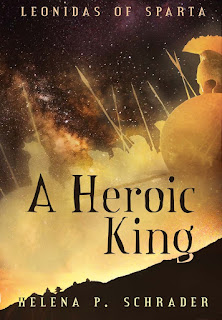We know very little about Spartan religious festivals -- except that they were taken seriously. We also know they were marked by choral and dance performances, by sports contests including chariot racing in which women drivers could participate, and sacrifices to the gods.
In the following excerpt from "A heroic King" I have tried to construct a Spartan festival based on these fragments of information. In the novel this festival is being celebrated after a devastating epidemic has killed hundreds of school children and the city is only slowly recovering as the epidemic has burned itself out.
The Feast of the Dioskouria, in honor of the Divine Twins was one of Sparta's most sacred holidays. However, because it fell after the autumn equinox, when travel was uncertain, it was not well-known outside of Lacedaemon and rarely attended by strangers. In consequence, it was more a domestic festival than the Hyacinthia, the Karneia, and the Gymnpaedia, but no less important in Spartan eyes.
The Dioskouria traditionally followed the end of the Phouxir, and was an opportunity to celbrate the successful graduation of a class of little boys to the status of youths. It also anticipated the winter solstice, when a class of eirenes would graduate to citizen status. The five day holiday celebrated the important deeds of the Divine Twins and culminated in a torchlight sacrifice at Kastor's Tomb, conducted by the reigning kings. Events included singing and dancing to mark the birth of the twins and their sister Helen, equestrian events in honor of Kastor, boxing to honor Polydeukes, and a day-long boar hunt culminating in an outdoor feast on the banks of the Eurotas. Throughout the holiday, special pear pastries and pear cider were consumed in large quantities. All in all, the Dioskouria was one of the Sparta's most pleasant festivals.
...
The third day of the Dioskouria commemorated the participation of the Dioskouroi in Herakles' hunt of the dangerous Kalydonian boar. The central event was a boar hunt led by the kings and guard, in which (theoretically) every able-bodied Spartan male participated. As citizen numbers had grown over the years, however, such a hunting party became unwieldy. Nowadays, many citizens, particularly the older men who felt they couldn't keep up with the Guard, went off in small groups to hunt on their own. The objective was to bring in as much game as possible to lay on the altar of the Divine Twins. After the hearts and livers of the game had been given to the Divine Twins, what was left of the carcasses was taken down to the Eurotas and the meat roasted over open fires for a collective feast.
...
The equestrian events on the fourth day of the Dioskouria included horse and chariot racing. One of the favorite events was a two-horse chariot race in which Spartan maidens drove light chariots in competition. Over the years it had become customary for the sweethearts of the maiden charioteers to gallop alongside their favorite's team, cheering and urging on the horses. Gorgo had hated the event because she didn't have a sweetheart, and though she was sure she could have won the race itself, she was ashamed to advertise her lack of popularity by competing.
...
The [final] choral performance struck a chord with the audience in a rare way. Somehow Euryleon had put together a program that acknowledged and honored the dead, but at the same time focused on new life. The story of Kastor was well suited to that, of course, and yet not every choral master could have pulled it off. The audience was given a chance to mourn, and Leonidas heard more than one person sobbing in the darkness behind him. Even Gorgo clutched his hand more tightly and dabbed at her eyes with her other. But then the maiden chorus came down the aisles of the amphitheater, singing lyrics about Helen guided home from Troy by the stars of her brothers in the night sky. Each girl was carrying an oil lamp and when they met in the center of the stage, they joined their lamps together to light a larger fire. They formed a circle and started to dance around it, soon joined by young men. The song was joyous, and the dancers, followed by the audience, started to clap in time. At the end, the audience broke out into thunderous applause.
Gorgo leaned to her husband to shout in his ear over the cheering, "Do you think they really have anything in Athens that can beat that?"


















